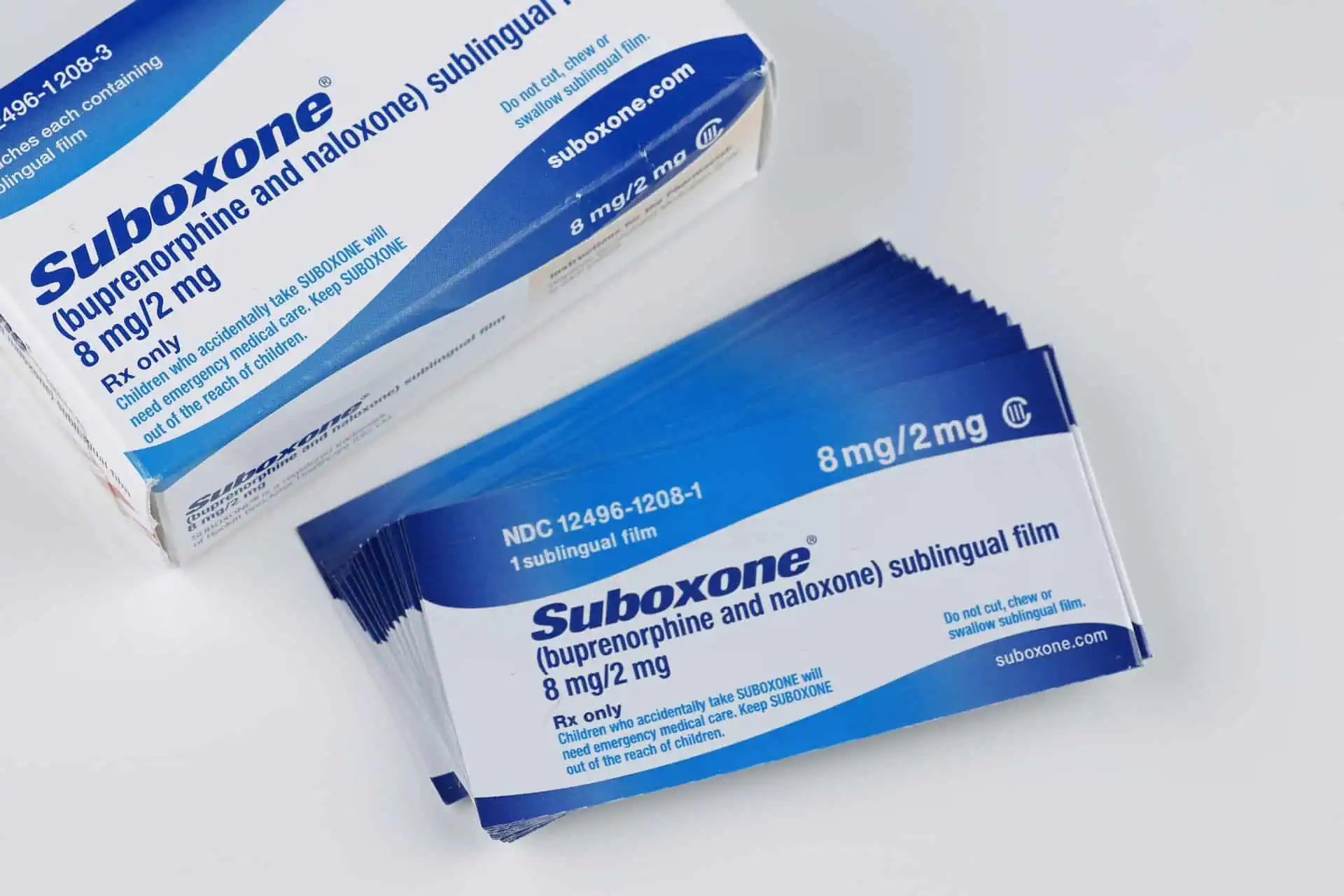Suboxone Oral Health Side Effects Reported by FDA
- Last Updated: June 12th, 2025

Attorney Jessica Paluch-Hoerman, founder of TruLaw, has over 28 years of experience as a personal injury and mass tort attorney, and previously worked as an international tax attorney at Deloitte. Jessie collaborates with attorneys nationwide — enabling her to share reliable, up-to-date legal information with our readers.
Legally Reviewed
This article has been written and reviewed for legal accuracy and clarity by the team of writers and legal experts at TruLaw and is as accurate as possible. This content should not be taken as legal advice from an attorney. If you would like to learn more about our owner and experienced injury lawyer, Jessie Paluch, you can do so here.
Fact-Checked
TruLaw does everything possible to make sure the information in this article is up to date and accurate. If you need specific legal advice about your case, contact us by using the chat on the bottom of this page. This article should not be taken as advice from an attorney.
Key takeaways:
- Buprenorphine is an effective medication for treating opioid use disorder, offering benefits such as reduced cravings, lower risk of misuse, and improved treatment retention when used in combination with counseling and behavioral therapies.
- Patients taking buprenorphine may experience dental issues like tooth decay, gum disease, and dry mouth, even if they have no prior dental problems, necessitating regular dental check-ups and maintaining good oral hygiene.
- Healthcare professionals should assess patients' oral health history before prescribing buprenorphine, refer them to dentists promptly, and collaborate with dental professionals to establish preventive plans and manage potential dental side effects effectively.
Overview of Suboxone Oral Health Side Effects
On this page, we’ll discuss Suboxone oral health side effects, the link between Suboxone and dental problems, how to manage Suboxone-related oral health issues, and much more.
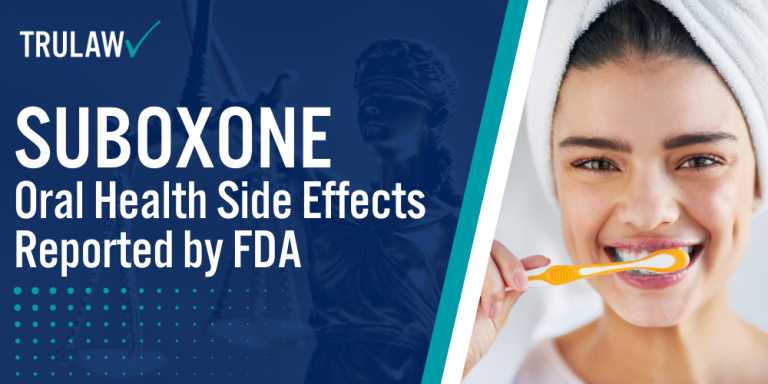
Intro to Suboxone Oral Health Side Effects
Some of the common oral health side effects associated with Suboxone include:
- Tooth Decay: Suboxone films have been linked to an increased risk of tooth decay, as the medication’s acidic nature can erode tooth enamel.
- Gum Disease: Suboxone use may contribute to the development of gum disease, including gingivitis and periodontitis, due to changes in oral flora and decreased saliva production.
- Oral Infections: The use of Suboxone films can lead to an increased susceptibility to oral infections, such as thrush or oral candidiasis.
- Dry Mouth: Suboxone can decrease saliva production, leading to dry mouth, which can further exacerbate dental problems.
If you have been prescribed Suboxone and are experiencing oral health side effects, it’s crucial to seek dental care and explore your legal options.
Contact Tru Law today using the chat on this page for a free case evaluation to discuss your Suboxone-related oral health concerns.
Table of Contents
Overview of the Suboxone Oral Health Side Effects
On this page, we’ll discuss an overview of Suboxone oral health side effects, outline the implications for dental health, delve into the FDA’s warnings about dental problems with buprenorphine, explore the specifics of transmucosal buprenorphine medicine, consider the impact of severe dental adverse events, and much more.
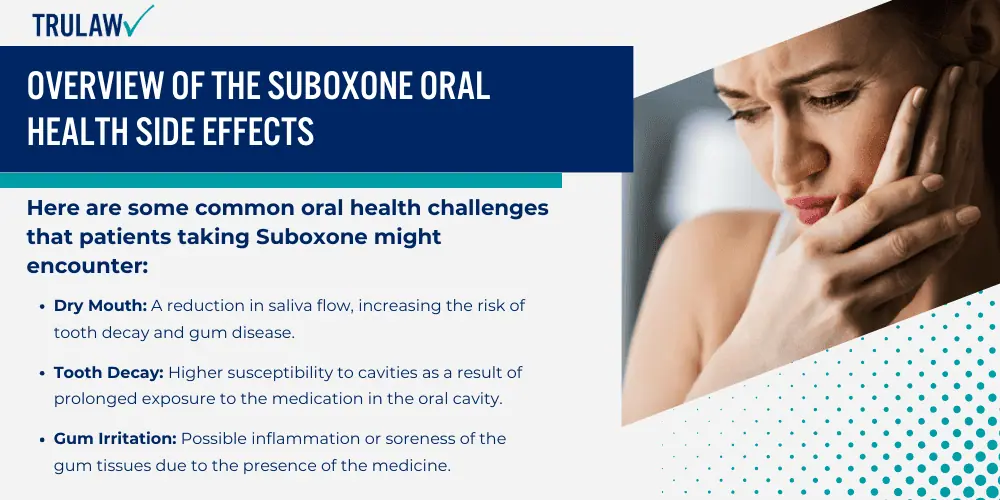
Introduction to Suboxone Oral Health Side Effects
Suboxone, a medication used to treat opioid addiction, can lead to side effects impacting oral health.
Patients may experience various dental issues due to the method of medication administration, which typically involves dissolving the drug in the mouth.
Here are some common oral health challenges that patients taking Suboxone might encounter:
- Dry Mouth: A reduction in saliva flow, increasing the risk of tooth decay and gum disease.
- Tooth Decay: Higher susceptibility to cavities as a result of prolonged exposure to the medication in the oral cavity.
- Gum Irritation: Possible inflammation or soreness of the gum tissues due to the presence of the medicine.
- Dental Erosion: Potential for the erosion of enamel over time, leading to heightened teeth sensitivity.
FDA Warning About Dental Problems with Buprenorphine
The FDA warns about dental problems regarding tooth decay stemming from medications containing buprenorphine, such as Suboxone, when taken orally.
They have reported occurrences of dental complications when the drug is completely dissolved in the mouth.
The FDA’s warning highlights several key points patients and healthcare providers should be aware of:
- Dental Problems Reported: Patients have experienced dental issues ranging from tooth decay to more severe oral health complications.
- Importance of Dental Hygiene: Emphasis on maintaining rigorous oral hygiene to mitigate the impact of Suboxone on dental health.
- Healthcare Provider Guidance: The FDA advises healthcare providers to educate patients on the potential oral side effects and preventive care.
- Monitoring Oral Health: Regular dental check-ups are recommended for early detection and management of dental adverse events.
Buprenorphine's Role in Treating Opioid Use Disorder
In the treatment of opioid use disorder (OUD), buprenorphine has become a key medication due to its efficacy and safety profile.
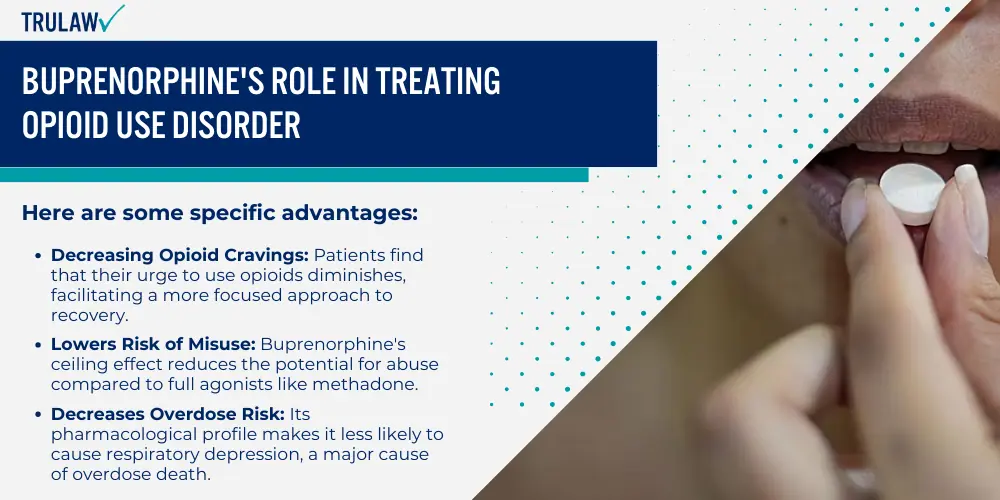
It serves as a steady foundation for successful recovery when used in medication-assisted treatment (MAT).
Benefits of Buprenorphine for Opioid Use Disorder
Buprenorphine is a partial opioid agonist that offers a range of benefits for individuals struggling with opioid overdose.
Here are some specific advantages:
- Decreasing Opioid Cravings: Patients find that their urge to use opioids diminishes, facilitating a more focused approach to recovery.
- Lowers Risk of Misuse: Buprenorphine’s ceiling effect reduces the potential for abuse compared to full agonists like methadone.
- Decreases Overdose Risk: Its pharmacological profile makes it less likely to cause respiratory depression, a major cause of overdose death.
- Improves Treatment Retention: Individuals taking buprenorphine are more likely to stay engaged in treatment programs, which is vital for long-term success.
Importance of Medication-Assisted Treatment (MAT)
Medication-assisted treatment combines buprenorphine medications with counseling and behavioral therapies.
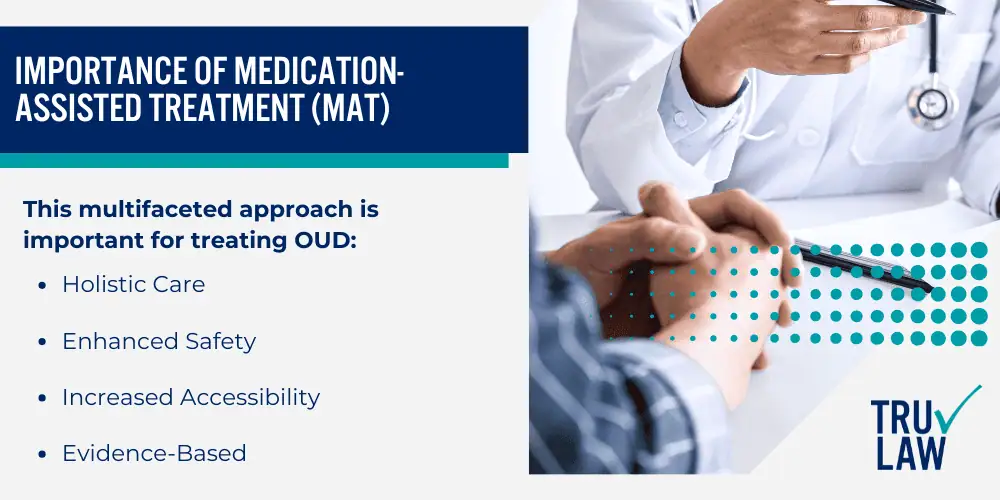
This multifaceted approach is important for treating OUD:
- Holistic Care: MAT addresses both the physical and psychological aspects of addiction.
- Enhanced Safety: Buprenorphine-containing medicines are dissolved under the tongue or inside the cheek, minimizing the risk associated with other routes of administration.
- Increased Accessibility: Patients can often receive buprenorphine from certified doctors outside of traditional clinic settings.
- Evidence-Based: Numerous studies have validated the effectiveness of buprenorphine in reducing opioid misuse and sustaining recovery efforts.
Dental Problems Associated with Buprenorphine
Buprenorphine, a medication commonly used to treat opioid use disorder, has been linked to other oral health issues.
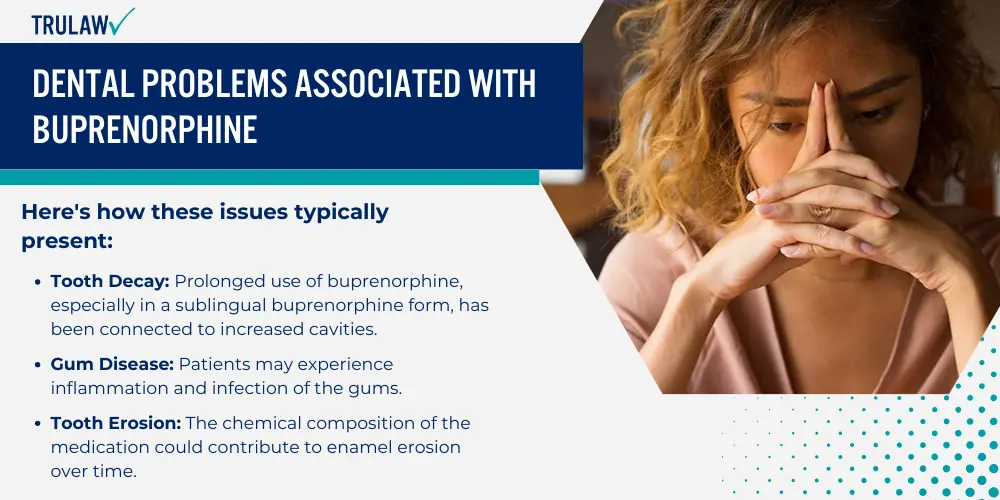
Even in individuals with previously good dental records, the risk of tooth problems persists when this medication is used.
Types of Dental Issues Reported with Buprenorphine
Tooth decay and oral infections are notable concerns for patients using buprenorphine-based medications.
Here’s how these issues typically present:
- Tooth Decay: Prolonged use of buprenorphine, especially in a sublingual buprenorphine form, has been connected to increased cavities.
- Gum Disease: Patients may experience inflammation and infection of the gums.
- Tooth Erosion: The chemical composition of the medication could contribute to enamel erosion over time.
- Dry Mouth: A common side effect that can lead to more severe dental issues due to reduced saliva flow, which is essential for oral health.
Risks Present Even in Patients with No Dental History
Patients with no prior dental problems are not exempt from experiencing dental issues while on buprenorphine.
Key observations include:
- Accelerated Onset of Dental Caries Preventive Plan: A preventive plan is essential, as the risk of rapid cavity development is higher.
- Increased Incidence of Oral Infections: Even patients with stellar dental health records can fall prey to oral infections.
FDA Requirements for Buprenorphine Prescribing Information
The Food and Drug Administration (FDA) has updated requirements for prescribing treatment information regarding buprenorphine to adequately inform healthcare professionals and patients of potential oral health problems.
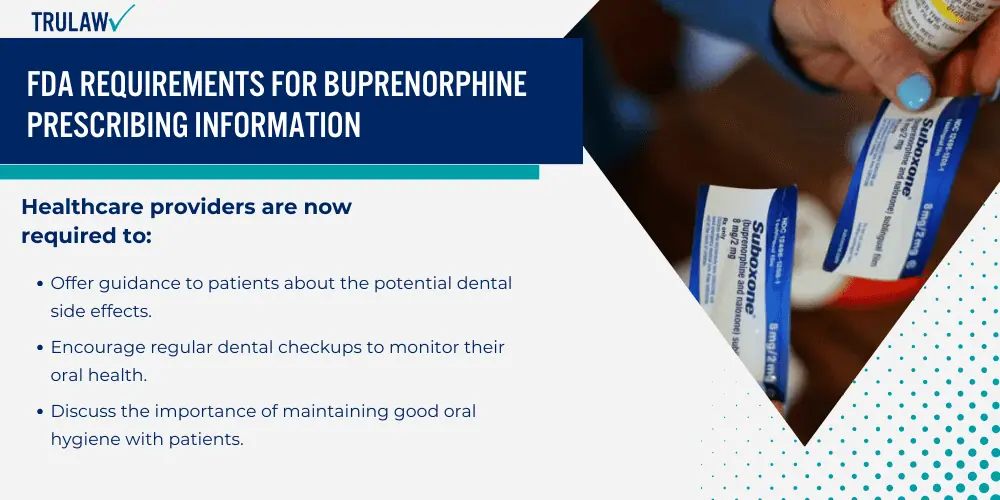
New Warning About Dental Risks in Prescribing Info
The FDA has imposed new warnings about the risk of severe dental problems for patients using buprenorphine.
These include a range of dental issues, from decay to oral sores.
Healthcare providers are now required to:
- Offer guidance to patients about the potential dental side effects.
- Encourage regular dental checkups to monitor their oral health.
- Discuss the importance of maintaining good oral hygiene with patients.
- Report any adverse dental events related to buprenorphine use.
Updated Patient Medication Guide with Dental Warnings
To ensure patient safety and well-being, the latest guidelines highlight the importance of dental health during medication use.
These new insights underscore the potential dental side effects of certain treatments.
Patients are also being provided with updated Medication Guides that:
- Explain how to recognize early signs of dental issues.
- Advise on preventative measures and daily oral healthcare routines.
- Instruct patients to promptly report oral discomfort or dental surgery needs to their healthcare provider.
- Encourage open communication with healthcare providers about any concerns with oral health problems while using buprenorphine.
Recommendations for Patients Taking Buprenorphine
Buprenorphine medication, while effective for opioid use disorder, can also lead to oral health challenges.
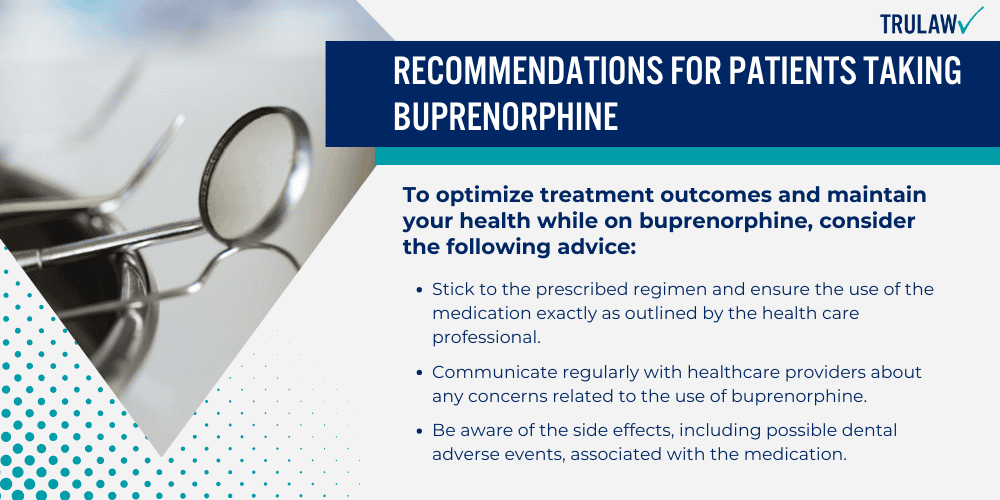
Patients should follow specific guidelines to preserve their dental health while undergoing suboxone treatment.
Continue Taking Buprenorphine as Prescribed
Buprenorphine should be continued as directed by a healthcare professional.
Stopping or altering the medication without guidance can lead to withdrawal symptoms and a potential relapse into opioid use.
To optimize treatment outcomes and maintain your health while on buprenorphine, consider the following advice:
- Stick to the prescribed regimen and ensure the use of the medication exactly as outlined by the health care professional.
- Communicate regularly with healthcare providers about any concerns related to the use of buprenorphine.
- Be aware of the side effects, including possible dental adverse events, associated with the medication.
- Reach out for a risk assessment if there’s a suspicion of developing dental problems as a side effect.
Steps to Minimize Risk of Serious Dental Problems
It’s crucial for patients to take proactive steps to prevent oral health issues while using buprenorphine.
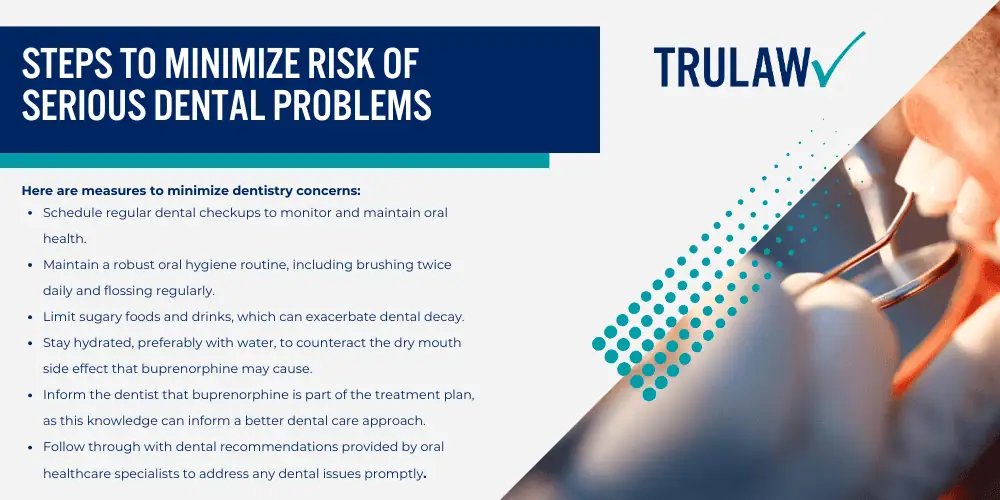
Here are measures to minimize dentistry concerns:
- Schedule regular dental checkups to monitor and maintain oral health.
- Maintain a robust oral hygiene routine, including brushing twice daily and flossing regularly.
- Limit sugary foods and drinks, which can exacerbate dental decay.
- Stay hydrated, preferably with water, to counteract the dry mouth side effect that buprenorphine may cause.
- Inform the dentist that buprenorphine is part of the treatment plan, as this knowledge can inform a better dental care approach.
- Follow through with dental recommendations provided by oral healthcare specialists to address any dental issues promptly.
Importance of Dental Care While Taking Buprenorphine
When prescribed buprenorphine, patients must prioritize their dental care.
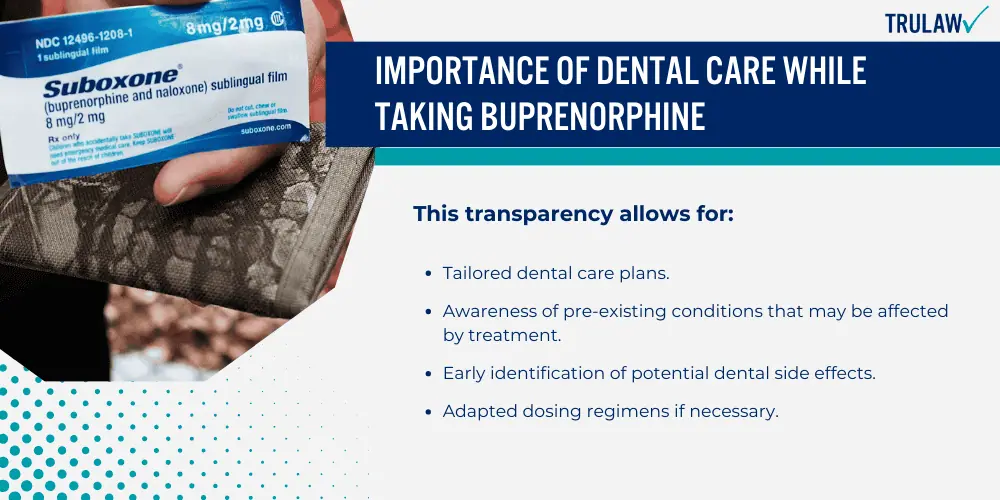
This medication, while beneficial for treating opioid use disorder, has been linked to possible dental health complications.
Staying proactive about oral health can help mitigate these risks.
Informing Healthcare Providers About Dental History
Healthcare providers must be fully informed about a patient’s oral health history before starting buprenorphine.
This transparency allows for:
- Tailored dental care plans.
- Awareness of pre-existing conditions that may be affected by treatment.
- Early identification of potential dental side effects.
- Adapted dosing regimens if necessary.
Scheduling Regular Dental Checkups During Treatment
It’s essential for patients on buprenorphine to schedule regular dentist visits.
This routine can help:
- Catch poor dental health issues early.
- Ensure a baseline dental evaluation for future reference.
- Allow for prompt dental treatment if problems arise.
- Maintain overall oral health during and after buprenorphine treatment.
Regular dentist appointments and clear dialogue with healthcare professionals ensure patients receive the comprehensive dental care they need while managing their treatment.
Healthcare Professionals: Prescribing Buprenorphine
When healthcare professionals prescribe buprenorphine, it’s essential to consider the potential oral health side effects.
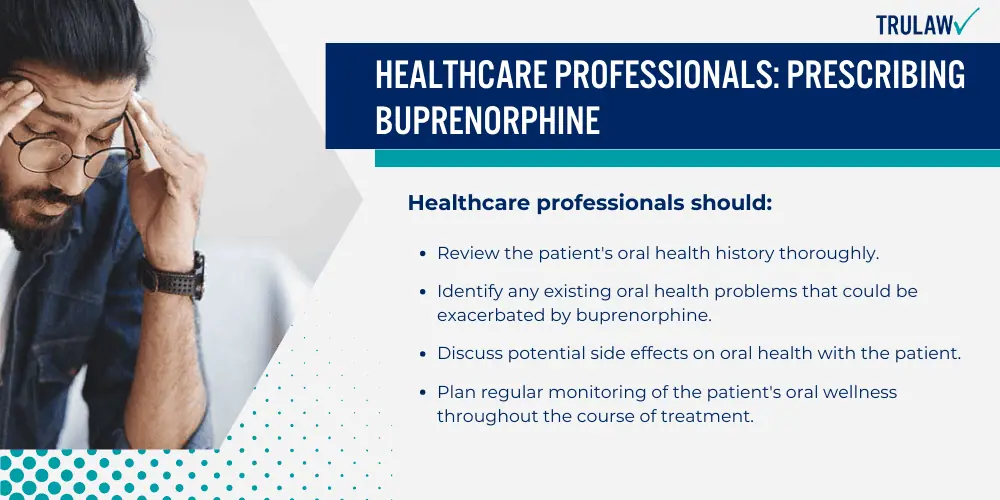
Incorporating oral health assessments and referrals into the treatment plan helps manage these risks effectively.
Assessing Patients’ Oral Health History Before Treatment
When initiating buprenorphine treatment, it is crucial for healthcare providers to gain a comprehensive understanding of the patient’s dental history.
This initial step is vital to ensure that the treatment plan accommodates the patient’s specific oral health needs and concerns.
Healthcare professionals should:
- Review the patient’s oral health history thoroughly.
- Identify any existing oral health problems that could be exacerbated by buprenorphine.
- Discuss potential side effects on oral health with the patient.
- Plan regular monitoring of the patient’s oral wellness throughout the course of treatment.
Buprenorphine medicine may lead to dental issues; thus, an upfront assessment sets a foundation for preemptive dental care services.
Referring Patients to Dentists Promptly After Starting Meds
Starting medications such as buprenorphine can have implications for oral health, necessitating close collaboration between healthcare providers and dental professionals.
Integrating dental care into the overall treatment plan is crucial to ensure patient well-being.
Upon prescribing buprenorphine, healthcare providers must:
- Facilitate a referral to a dentist for a baseline oral health examination.
- Communicate with dental professionals about the patient’s prescribed treatment, ensuring continuity of care.
- Encourage patients to maintain regular appointments with their dentists as a preventative measure.
- Advise on maintaining optimal at-home oral hygiene practices to reduce the risk of complications.
Prompt dental referrals can prevent the development of severe oral health problems associated with buprenorphine use.
Dentist Recommendations for Treating Buprenorphine Patients
When treating patients who use buprenorphine, dental professionals play a crucial role in managing oral health risks.
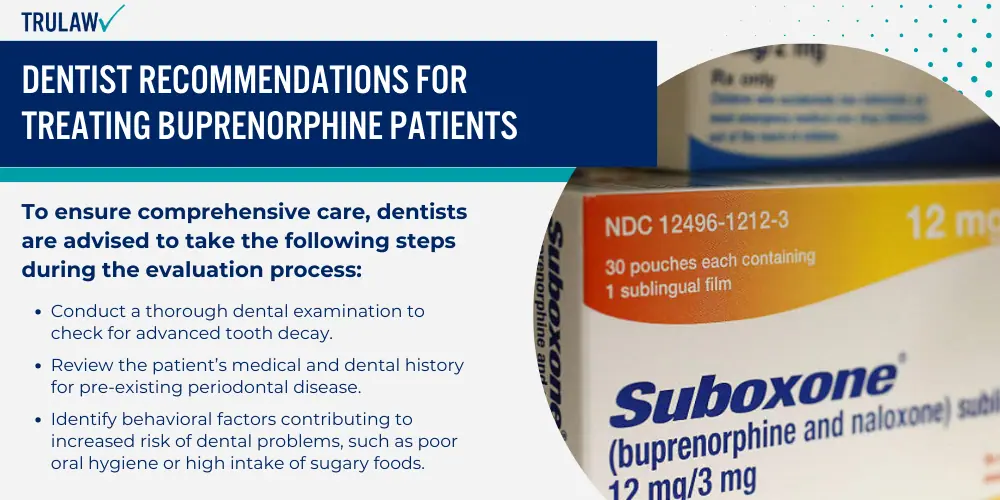
Dentists should focus on early assessment and proactive measures to prevent dental decay.
Performing Baseline Dental Evaluations and Risk Assessments
Dentists should initiate caries risk assessment during the initial visit.
These evaluations are essential for establishing a patient’s current oral health status and identifying potential risks for dental decay due to buprenorphine use.
To ensure comprehensive care, dentists are advised to take the following steps during the evaluation process:
- Conduct a thorough dental examination to check for advanced tooth decay.
- Review the patient’s medical and dental history for pre-existing periodontal disease.
- Identify behavioral factors contributing to increased risk of dental problems, such as poor oral hygiene or high intake of sugary foods.
- Document baseline measurements to monitor the progression of dental caries over time.
Establishing Preventive Plans for Patients Dental Health
Creating preventive strategies is imperative to minimize the risk of extensive tooth decay for patients on buprenorphine.
To ensure optimal oral health, consider implementing the following preventive measures:
- Educate patients on proper oral hygiene techniques to diminish the onset of dental caries.
- Recommend routine fluoride applications to reinforce tooth extraction enamel and decrease decay risk.
- Discuss diet modifications to reduce high sugar consumption, a common factor in dental decay.
- Plan regular follow-up visits to reassess oral health status and adjust the preventive care plan as necessary.
Suboxone Lawsuit Frequently Asked Questions
-
What legal actions are available for individuals affected by tooth decay from Suboxone?
Individuals who have experienced tooth decay as a result of taking Suboxone may consider seeking legal advice to explore their rights for compensation through a personal injury lawsuit.
These legal actions might help recover costs for dental treatment, suffering, and any associated damages.
-
How can buprenorphine cause dental issues?
Buprenorphine, the active ingredient in Suboxone, can cause dry mouth, which reduces saliva production and may lead to increased dental problems such as tooth fracture and gum disease.
Additionally, buprenorphine medicines dissolved in the mouth can be particularly harmful to oral health.
-
Is there a deadline for joining the Suboxone dental lawsuit?
There are typically statutes of limitations that apply to legal claims, which set deadlines for when a lawsuit must be filed.
Prospective plaintiffs should consult an attorney promptly to determine the deadline for joining a Suboxone dental lawsuit.
-
What compensation has been awarded in Suboxone tooth decay legal cases?
The compensation in legal cases related to Suboxone tooth decay varies and may include damages for dental treatment costs, pain and suffering, and lost wages.
Each case is unique, and the awarded compensation is determined based on the specific circumstances and severity of the dental issues.
-
Are there specific dental procedures to be cautious of while taking Suboxone?
While on Suboxone, it’s advisable to inform your dentist immediately about your medication, as certain dental procedures may require adjustments in your treatment.
For example, dental surgeries may necessitate a temporary change in Suboxone dosage to manage pain more effectively.
-
What are the most severe dental side effects associated with Suboxone use?
The most severe dental side effects reported from Suboxone use include tooth decay, severe cavities, oral infections, and tooth loss.
These can be significant and were reported even in patients with no history of dental issues, suggesting a strong linkage to the medication.

Managing Attorney & Owner
With over 25 years of legal experience, Jessica Paluch-Hoerman is an Illinois lawyer, a CPA, and a mother of three. She spent the first decade of her career working as an international tax attorney at Deloitte.
In 2009, Jessie co-founded her own law firm with her husband – which has scaled to over 30 employees since its conception.
In 2016, Jessie founded TruLaw, which allows her to collaborate with attorneys and legal experts across the United States on a daily basis. This hypervaluable network of experts is what enables her to share the most reliable, accurate, and up-to-date legal information with our readers!
Additional Suboxone Lawsuit resources on our website:
Here, at TruLaw, we’re committed to helping victims get the justice they deserve.
Alongside our partner law firms, we have successfully collected over $3 Billion in verdicts and settlements on behalf of injured individuals.
Would you like our help?
At TruLaw, we fiercely combat corporations that endanger individuals’ well-being. If you’ve suffered injuries and believe these well-funded entities should be held accountable, we’re here for you.
With TruLaw, you gain access to successful and seasoned lawyers who maximize your chances of success. Our lawyers invest in you—they do not receive a dime until your lawsuit reaches a successful resolution!
AFFF Lawsuit claims are being filed against manufacturers of aqueous film-forming foam (AFFF), commonly used in firefighting.
Claims allege that companies such as 3M, DuPont, and Tyco Fire Products failed to adequately warn users about the potential dangers of AFFF exposure — including increased risks of various cancers and diseases.
Depo Provera Lawsuit claims are being filed by individuals who allege they developed meningioma (a type of brain tumor) after receiving Depo-Provera birth control injections.
A 2024 study found that women using Depo-Provera for at least 1 year are five times more likely to develop meningioma brain tumors compared to those not using the drug.
Suboxone Tooth Decay Lawsuit claims are being filed against Indivior, the manufacturer of Suboxone, a medication used to treat opioid addiction.
Claims allege that Indivior failed to adequately warn users about the potential dangers of severe tooth decay and dental injuries associated with Suboxone’s sublingual film version.
Social Media Harm Lawsuits are being filed against social media companies for allegedly causing mental health issues in children and teens.
Claims allege that companies like Meta, Google, ByteDance, and Snap designed addictive platforms that led to anxiety, depression, and other mental health issues without adequately warning users or parents.
Transvaginal Mesh Lawsuits are being filed against manufacturers of transvaginal mesh products used to treat pelvic organ prolapse (POP) and stress urinary incontinence (SUI).
Claims allege that companies like Ethicon, C.R. Bard, and Boston Scientific failed to adequately warn about potential dangers — including erosion, pain, and infection.
Bair Hugger Warming Blanket Lawsuits involve claims against 3M — alleging their surgical warming blankets caused severe infections and complications (particularly in hip and knee replacement surgeries).
Plaintiffs claim 3M failed to warn about potential risks — despite knowing about increased risk of deep joint infections since 2011.
Baby Formula NEC Lawsuit claims are being filed against manufacturers of cow’s milk-based baby formula products.
Claims allege that companies like Abbott Laboratories (Similac) and Mead Johnson & Company (Enfamil) failed to warn about the increased risk of necrotizing enterocolitis (NEC) in premature infants.
Here, at TruLaw, we’re committed to helping victims get the justice they deserve.
Alongside our partner law firms, we have successfully collected over $3 Billion in verdicts and settlements on behalf of injured individuals.
Would you like our help?
